Four Police Brutality Reforms to Focus On: A Libertarian Take
It's going to take a while.
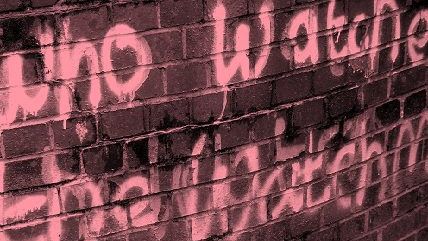
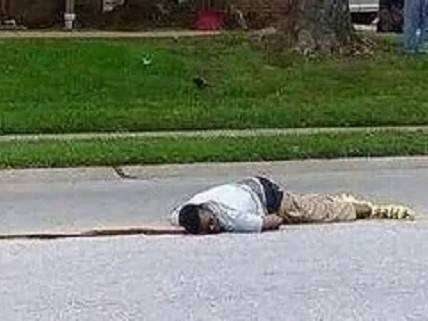
The killing of Michael Brown in Ferguson, Missouri, last month by Officer Darren Wilson led to weeks of protest, a militarized police response to early reports of rioting, and a "national discussion" about police militarization, racism, and police brutality. The police killing of Michael Brown was not unique. Although comprehensive statistics are not available, at least 387 justified homicides by cops were reported to the Bureau of Justice Statistics (BJS) in 2010, while 2,958 people were killed by cops between 2003 and 2009, according to the BJS' Arrest-Related Deaths report. The BJS defines arrest-related as a situation in which police are detaining or restraining an individual. Although the BJS notes its numbers are incomplete, it says the data breakdown is representative of the nature of arrest-related deaths, if not the volume. Seventy-five percent of arrest-related homicides by cops are of suspects in violent crimes, while 14 percent are of suspects in property, public disorder, or drug crimes. Some 1.6 percent of homicides occur when no charge was intended, and for 9.2 percent a charge isn't reported. The BJS also offers a demographic breakdown: 95 percent of victims of homicide by cop are men, 42 percent are white, 32 percent are black, and 20 percent are Hispanic.
The problem of police brutality—often shaped and directed by racism and class distinctions—also cuts across American society. It's not just a problem in Ferguson, where Brown was shot and killed on Saturday, August 9th, or in Los Angeles, where Ezell Ford was shot and killed on Monday, August 11th, or San Jose, where Diana Showman was shot and killed on Thursday, August 14th, or in Ohio where John Crawford was shot and killed Tuesday, August 5th. While police work will always include the possibility of justifiable homicide by cops (short of an absolute prohibition), there are policy reforms at the local, state, and national level that can help create a system of accountability that doesn't produce Soviet-style percentages for justified shootings and that restores trust in police forces through robust disciplinary and oversight processes in police departments. There are other reforms that can limit the kinds of engagements police are permitted, ordered, and even required to have with the public. It will require a longer attention span than any one police brutality story, no matter how awful, can maintain. Here are four issues police brutality-oriented policy reform should address
1. Body cameras and other surveillance of police
After the killing of Michael Brown, the police chief told a local television station the department had body cameras that hadn't been deployed yet. Now the police department says it's going to raise money for body cams and dash cams (!) as part of an effort to rebuild trust with the community. The lack of dash cam is particularly disturbing—one study found dash cam video exonerated cops in 93 percent of instances, something Reason science correspondent Ronald Bailey mentioned in a 2013 column, "Watched Cops are Polite Cops." Bailey explained that while body cameras are an important tool, certain policies should be put in place to make them effective—ensuring they are on when they need to be and that the privacy of people being recorded is protected, for instance.
Body cameras have gotten a lot more airplay since the events in Ferguson became national news, but the fact that they haven't yet been universally adopted points to more systemic problems that need to be addressed.
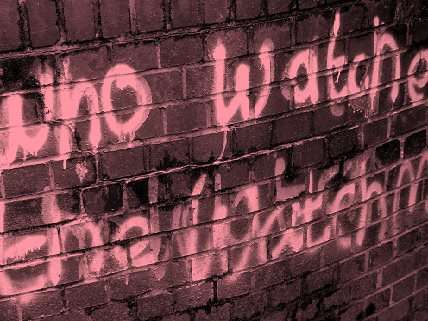
2. Police oversight
Over the last decade, the Department of Justice has investigated and monitored more than a dozen police departments around the country and in Puerto Rico, most recently in places like Albuquerque and Newark. However, federal measures are often opposed by police officers and their unions. In Seattle, cops argued the mandates effectively infringed on their (no joke) Fourth Amendment right to reasonable searches and seizures, a lawsuit even the Seattle police union couldn't get behind, although the one in Albuquerque appeared interested.
Independent oversight is one of the first components of any police reform, largely because it works to restore trust in a police system that is often insular and resistant to criticism and responsibility for wrong doing, as Walter Katz, a police oversight lawyer in southern California, explains. "Starting at having civilian oversight is a critical component" of any reforms, he told Reason. "Use of civilian oversight is a way of enhancing transparency, and by virtue of transparency then also accountability."
When they are effective, civilian oversight boards can be attacked by police unions. When the Police Advisory Commission in Philadelphia asked cops to apologize to citizens who have complained of mistreatment, the Fraternal Order of Police sent them a letter claiming the commission was trying "to further weaken and demoralize the Philadelphia Police Department in a time of crisis with a significantly growing crime problem in this City. The danger your policy poses to our citizens is both reckless and inexcusable." When asked about the letter, the commission's executive director called it not factual and said he wouldn't engage it.
And while police may not see civilian oversight agencies as "understanding" police work, residents may also accuse agencies of being rubber stamps. "Civilian oversight also has to meet that challenge of accusations," says Katz. "Effectiveness is not easy. We can look at an oversight agency and ask have they been effective in reducing force or increasing transparency?"
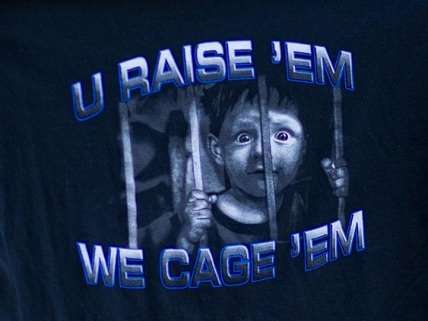
3. Police unions
Katz believes unions can and must be brought on board for reforms. "Police reform is effective when all the stakeholders buy into it," he says. "Often it's not a matter of policy, it's a matter of culture, and those cultures are built over a long period of time." Numbers like the 93 percent of officers exonerated by dash cam footage point to police reforms working for cops, too. Body cams lower the incident of police brutality complaints because it discourages cops from acting badly and residents from filing false complaints.
The Cato Institute's Walter Olson, who runs the legal blog Overlawyered.com, isn't as optimistic about unions, however. "Police unions are central to the problem," he told Reason. "Their ideas of due process for officers accused of wrongdoing often prevent the removal of cops who are a menace to citizens' rights, municipal liability budgets, or both." Olson points out that police unions operate like other public unions: "They are often found resisting efforts to reduce waste, featherbedding, and even corruption. When they obtain bargaining rights over the effects of policy changes they acquire enormous leverage over everything from equipment choice to rules for citizen-police interaction." That police unions produce rules that protect bad actors, then, is a feature not a bug.
The problem of police unions preventing reform can be seen in places like Philadelphia, where the city's police commissioner, Charles Ramsey, doesn't have final authority over employment decisions—a situation many police comissioners and chiefs around the country find themselves in. In Philadelphia, cops have enjoyed protection from termination via "arbitration" since Mayor Frank Rizzo, a life-long police officer and police commissioner, negotiated such a contract with the police department in the 1970s.
Thus while Ramsey has fired 146 cops since 2008 (88 of whom have been charged, and 48 convicted, of crimes such as murder, rape, and extortion), there are plenty of bad apples left on payroll. Meanwhile in places like Hometown, Illinois, where the entire police force is part-time and thus ineligible for Illinois' general civil service employee protections, a cop who shoots a dog in front of a six-year-old on a Friday can be fired on a Monday.
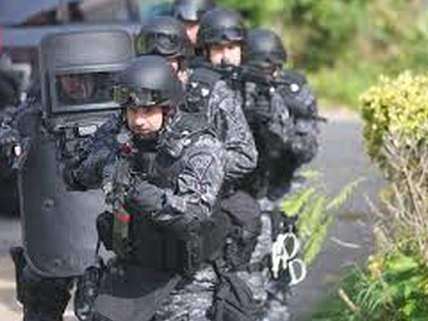
4. The War on Drugs and petty law enforcement
While bad cops and a poisonous police culture play their role in the epidemic of police brutality, so do bad laws. The most obvious are drug laws. As Radley Balko wrote in his in-depth book Rise of the Warrior Cop, though 9/11 may have accelerated the militarization of police officers in America, the trend actually began with the declaration of the War on Drugs in 1971. This has led to the present situation, where multiple raids occur each day across the country, often on drug-related warrants. Such operations introduce violence to combat non-violent narcotics use and sale associated with violence only because of the laws criminalizing it.
As Jacob Sullum explained in a column last week, "The Literal War on Drugs," when it comes to police militarization, the use of SWAT teams is a greater menace than armored vehicles. Indeed, while the daily drug raids around the country produce lots of awful stories, even a baby critically injured by a flashbang grenade used in a raid over a small amount of meth (that wasn't found) doesn't get the kind of attention a Michael Brown story can. The misinformed idea that "drugs are bad" provides cover for bad behavior by cops and ensures that it will continue.
Petty laws play their part in increasing the incidence of police brutality as well. Eric Garner died at the hands of cops during an interaction that began over loose untaxed cigarettes, while a pregnant woman in New York City was put in a chokehold because she was grilling on the sidewalk in front of her house. Mayor Bill De Blasio, who supports New York's status as a sanctuary city, nevertheless insists "the law's the law" when it comes to strict enforcement of petty laws that disproportionately affect poor and marginalized communities. Such laws will always provide excuses for police to confront otherwise peaceful people.
Editor's Note: As of February 29, 2024, commenting privileges on reason.com posts are limited to Reason Plus subscribers. Past commenters are grandfathered in for a temporary period. Subscribe here to preserve your ability to comment. Your Reason Plus subscription also gives you an ad-free version of reason.com, along with full access to the digital edition and archives of Reason magazine. We request that comments be civil and on-topic. We do not moderate or assume any responsibility for comments, which are owned by the readers who post them. Comments do not represent the views of reason.com or Reason Foundation. We reserve the right to delete any comment and ban commenters for any reason at any time. Comments may only be edited within 5 minutes of posting. Report abuses.
Please to post comments


Get rid of immunity.
Get rid of special rules, like 48 hours after an incident before they can be questioned.
When they break the law, or are suspected of it, treat them exactly as any civilian would (and no shit they are civilians in the military sense, but you know exactly what it means in the jargon sense).
Require them to buy their own insurance out of their own pocket. Yes, they will demand raises to cover it, and will get it, but only for some base amount; bad apples will have real incentive to be civil.
Write into their contracts that any policeman who interferes with a citizen recording a police encounter will lose his job. Period. Tell the union that that is non-negotiable.
^ THIS ^
That and harassing people for sitting, standing or walking in public. Fuckers push people around and call it loitering. How the fuck do you loiter in a park? Or while walking?
No need for more special cases; it's a natural outcome of shedding immunity and special rules for cops. If they assault someone during a false arrest, for charges which are later dropped because they are so ludicrous, they get sued and their cop-insurance premiums go up, with the nice side effect of making them less believable as a witness, and thus less employable.
RICO charges against the unions for conspiracy to commit civil rights violations in situations where known bad cops were placed back into service.
I thought this was a pretty good article on the subject: http://www.politico.com/magazi.....10038.html
Summary, "What I Did After Police Killed My Son" -- "And so, together with other families who lost loved ones, I launched a campaign in the Wisconsin legislature calling for a new law that would require outside review of all deaths in police custody."
And got it passed.
Reason, in a somewhat rare example of reasonableness regarding police is spot on in one regards. Body cameras are a huge boon and help punish bad cops and help protect good cops from bogus accusations. Our department won't let us wear body cameras in my department however I can count several officers who have been protected from what we're confirmed as either completely fabricated complaints or simply factually wrong complaints because of the availability of either cell phone video private surveillance cameras etc. that caught an incident on video. Privacy advocates myself included do have some concerns about body cameras since they do often record people in situations who have been victimized etc. and do not want to be on videotape or audiotape. There have to be safeguards to protect people who come to police but do not want to be recorded in regards to how these recordings if taken are properly disposed of after. Time etc. This is certainly not a huge obstacle though and all other things considered when in doubt it's best to have everything recorded for everybody's protection. In addition to those I'm personally involved with there are plenty of examples on YouTube or policeone where a video tape is able to exonerate an officer in an otherwise dangerous situation for him in terms of public outrage etc. over perceived violations.
Washington is a two-party consent state which makes a lot of officers extremely hesitant to audio record encounters even though if they research the caselaw it clearly does not view police encounters with citizens as "private conversations" in modt instances and only those are protected by to party consent laws in the state. I strongly support mandatory body Camera use for police and at least in my department there have been several officers who have advocated through our union to change our departments policy and make it so we are allowed to wear them on patrol. Body cameras empower police officers to be able to gather evidence to protect themselves from bogus complaints and disempower arbitrary capricious and unfair punishment by internal affairs etc. in situations where Evidence is ambiguous. Three of my partners who were recently hired back after arbitrators overturned bogus internal affairs terminations, clearly would've been able to fight the bogus allegations prior to termination if they had been able to wear body cameras. Body cameras also often offer rock solid evidence that can allow cops to be prosecuted for incidents including false sworn statements about same and will also offer a method for officers and their unions to go after scumbags Who try to incriminate officers with knowingly false statements about their behavior.
Gordon Graham recounts numerous incidents where recordings have saved cops from serious misconduct allegations including some made by extremely powerful people such as high-ranking politicians judges etc. where police officers would have been in extreme jeopardy
Two-party Consent laws need to be rewritten to explicitly not apply to in person interactions with police, in either direction.
Two-party consent laws need to be repealed.
Funny, how cameras are an unalloyed benefit to "good" cops, yet there seem to be so many cops, and departments, that either don't want them or won't use them if they have them. Including the one in Ferguson.
It almost makes you think there's a lot of cops that maybe aren't "good" cops, who think a camera will cramp their style or something.
But cameras are just a bandaid. We've seen that prison footage of the guards dragging a guy out of camera range to beat him (to death?). The core problem here runs much deeper, into the core of cop culture. Step one should be stripping, or at least seriously limiting, sovereign immunity. Or outlawing pubsec unions as bargaining units. Either one, really.
Yeah, the fact that 93% of recordings exonerate cops just tells me that in 7% of recorded cases, the cop was too dumb or arrogant to either destroy the recording or make sure his crimes were not recorded in the first place.
If you want civilian review of police actions, then there must be a moratorium on TV police dramas for at least a generation.
Civilians cannot be an accurate judge of an officer's reactions when they only have a TV producer's example of how police operate and what they face.
And you can't have it both ways - if you want police to wear body-cams (not a bad idea) you can't, then, claim concern over the privacy of those with whom they interact. No other concern than the physical safety of the officer and those innocents around him should be allowed to distract him.
Start working at home with Google! It's by-far the best job I've had. Last Wednesday I got a brand new BMW since getting a check for $6474 this - 4 weeks past. I began this 8-months ago and immediately was bringing home at least $77 per hour. I work through this link, go? to tech tab for work detail
---------------------- http://www.jobs700.com
By civilian oversight, I assume you mean juries?
How about addressing the cozy relations between prosecutors and cops? As long as they are thick as thieves (sometimes literally) cops will never get convicted of anything but the most undeniably horrific of crimes. Nothing like getting prosecuted by your best friend, right?
Adversarial only seems to apply to us mere mortals. Cops get prosecuted by the same DAs who they've been working closely with their whole careers. Everyone in workplace is apt to protect their co-workers as much as they can from outsiders. The weak idea of using a bordering jurisdiction is useless. Do we really think a prosecutor only protect HIS counties officers, willing throwing the next's under a bus?
And who allowed all the career protections to come about? If it's near impossible to get fired, people are going to act like it. I've had to fire a bunch of people, and they had no such special immunity. I shudder to think if they had KNOWN they could do whatever they wanted without facing termination.
Why do you keep quoting this b.s.? There is no evidence that Ferguson had anything to do with racism. And while it's hard to find good national statistics, for NYC, for example, police killings are racially representative... of suspects and police attackers. There is no evidence that racism or class motivates police to attack people; when there is disparate impact, it is due to other factors beyond the control of police (or politics, for that matter).
Other than that, body cameras are a good idea, but why does the federal government need to butt in? And although police oversight seems a bit weak and police unions seem a bit strong, so what? If cities want to make changes, they can.
The only federal matter here is the war on drugs, which is both directly pursued by the federal government, and in which the federal government forces states and local governments to do its dirty work. That is wrong both as a policy and as an exercise of federal power. The war on drugs should, of course, be ended, but that won't end the abuse of federal power.
You really gotta roll with the punches.
http://www.Crypt-Anon.tk
The problem of police brutality?often shaped and directed by racism and class distinctions...
So then a libertarian writer buys into cultural marxist collectivist slogans? What evidence can you present that "racism" and "class distinctions" shape police brutality? Was this the case at Waco? Or Ruby Ridge? In the latter, it was law enforcement anti-racism which shaped the government killing of innocent citizens and the attempted railroading of the victims' family member.
Libertarianism is never going to be accepted by ambulance chasing after collectivism. You'll be held in contempt by the real collectivists while alienating the partisans of individual liberty.
who care's what a nutjob libertarians take on anything is?
But they have such compelling arguments like "Fuck off slaver" and "go suck the government cock". How can you NOT be convinced by such strong debating skills?
And what would be an example of one of your compelling arguments? Oh yeah, "anyone who reveals the crimes of my precious agency is a traitor!"
my neighbor's step-aunt makes $74 /hour on the internet . She has been out of a job for seven months but last month her check was $12917 just working on the internet for a few hours.
find more information========== http://www.jobsfish.com